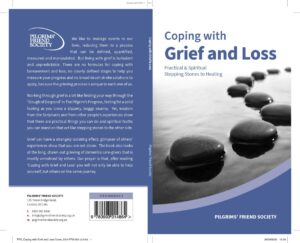
Next week, May 8 to 14, is ‘Dying Matters Awareness Week’. It’s Hospice U.K.’s flagship national campaign and according to the website, the aim is to ‘get people talking and sharing stories openly about dying and grief, to reduce the associated stress, stigma and social isolation.’ I’m not sure if there is actually stigma attached to dying or death, but stress ranks top of the list for severity.
God did not intend for us to die. He warned the first humans, Adam and Eve, not to eat of the tree of the knowledge of good and evil, because it would cause their death. But they disobeyed and as a result, death is in the human line. And even though we know death is inevitable, when someone close dies, even when it’s at the end of a long illness, it registers a visceral shock in us because we know deep in our souls, that it’s wrong, it’s unnatural, it was never meant to be.
There should never be ‘social isolation’ in grief. Too often people stay away because they don’t know how to behave, or what to say. People need people. I love the Jewish practice of sitting Shiva, (Shi’vah is the Hebrew world for seven.) It’s where friends and members of the family come and sit with the bereaved person. They will take meals, or cake, going to sit, talk or not to talk, following the person’s lead. And importantly they will tell stories of the person who has died, giving them permission to laugh, cry, and share memories together. It happens like this all over the world, although it’s not called Shi’vah, it’s just ‘going around.’ In communities in America people will bring cake, and meals, and just keep the bereaved person company awhile. In the UK, it shouldn’t be left to just the church leader to visit. I’ll always be grateful for the neighbours who came and sat with me after my grandson, Luke, was killed in a motorcycle accident. They talked among themselves with me coming in and out of the conversation occasionally, but so grateful that they were there.
A time of mourning is not a one off thing that you go through and can eventually wrap up and put away. It can be triggered unexpectedly. A close relative lost two children to a rare disease, and then her husband to Leukaemia. She wrote, ‘Sometimes I watch a video or see a picture or a celebration, and I suddenly think that I should have a beautiful daughter who turns 21 next month AND another son who would probably be in grad school or beginning a family OR at the very LEAST my husband to hold me when my mind gets lost in those places and the pain is so intense that I can’t even breathe. It’s not so often now, but it’s never far away. Then, I deliberately face forward again, and I choose joy, and I dance my mind back to where I want to be. Choose To Be Happy, my friends!’
In dancing her mind forward this beautiful lady chooses to focus on the blessings she has now, and more –‘ the things which are not seen: for the things which are seen are temporal; but the things which are not seen are eternal.’ (2 Corinthians 4:18). We couldn’t do this by ourselves, but God has given us His Holy Spirit as a pledge, ‘a guarantee of our inheritance,’ (Ephesians 1:14 NKJV). We can choose to be happy.
 The old hymn sums it up very well – https://www.youtube.com/watch?v=LGAdaGbmfFs. And if you go to this link you can get a copy of the booklet, ‘Coping with Grief and Loss.’ https://www.pilgrimsfriend.org.uk/resources/coping-with-grief-and-loss
The old hymn sums it up very well – https://www.youtube.com/watch?v=LGAdaGbmfFs. And if you go to this link you can get a copy of the booklet, ‘Coping with Grief and Loss.’ https://www.pilgrimsfriend.org.uk/resources/coping-with-grief-and-loss














